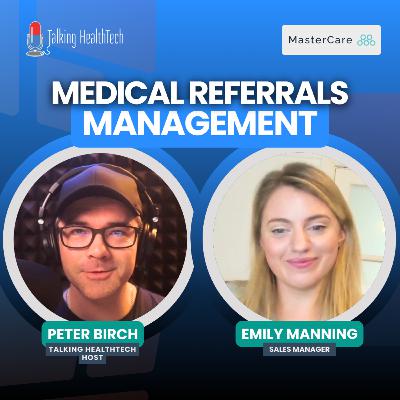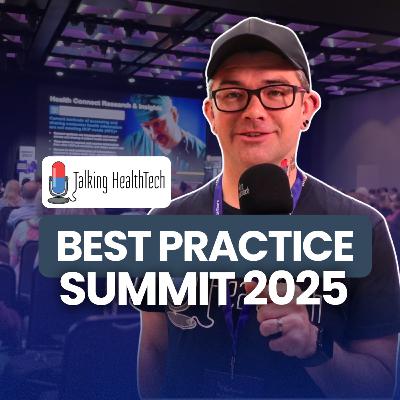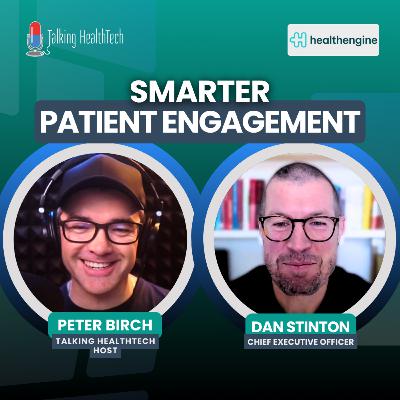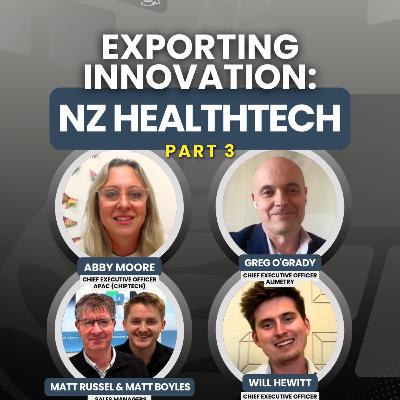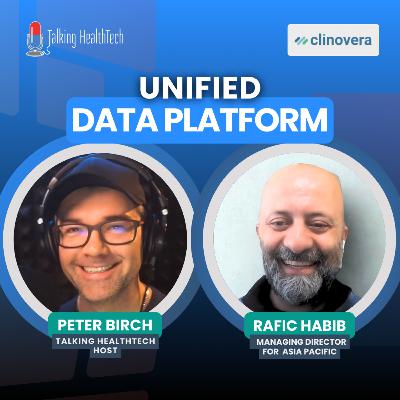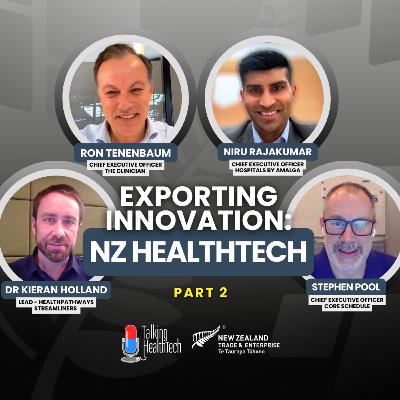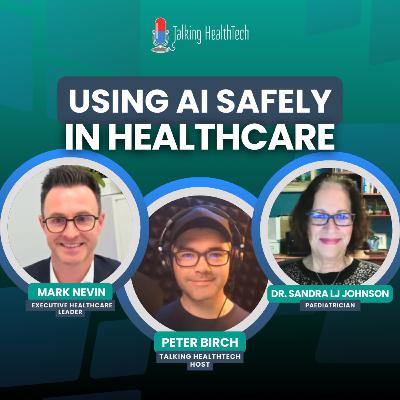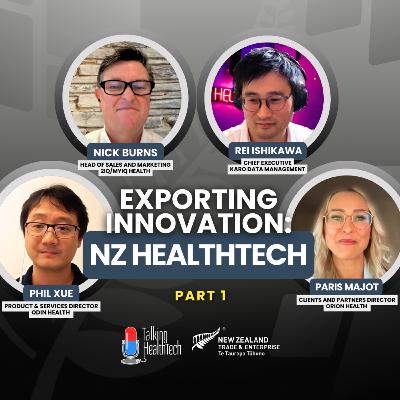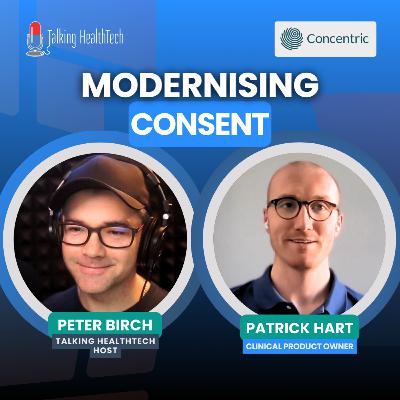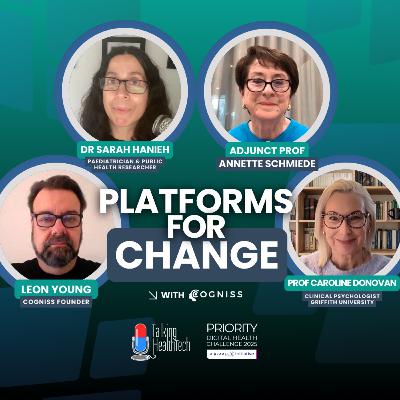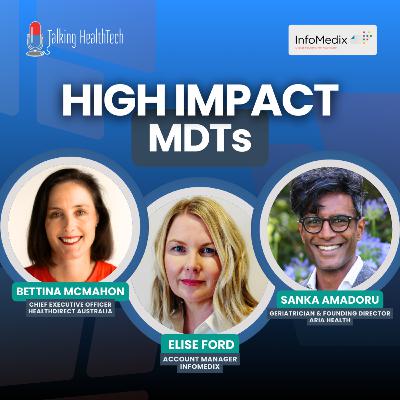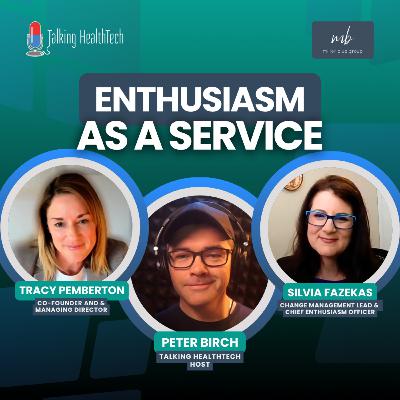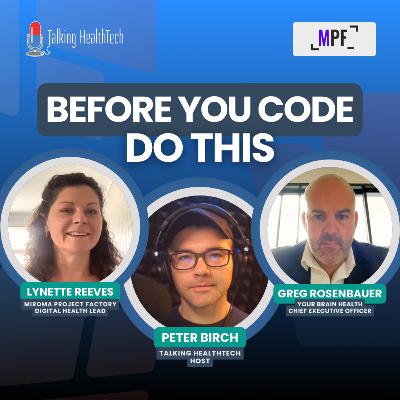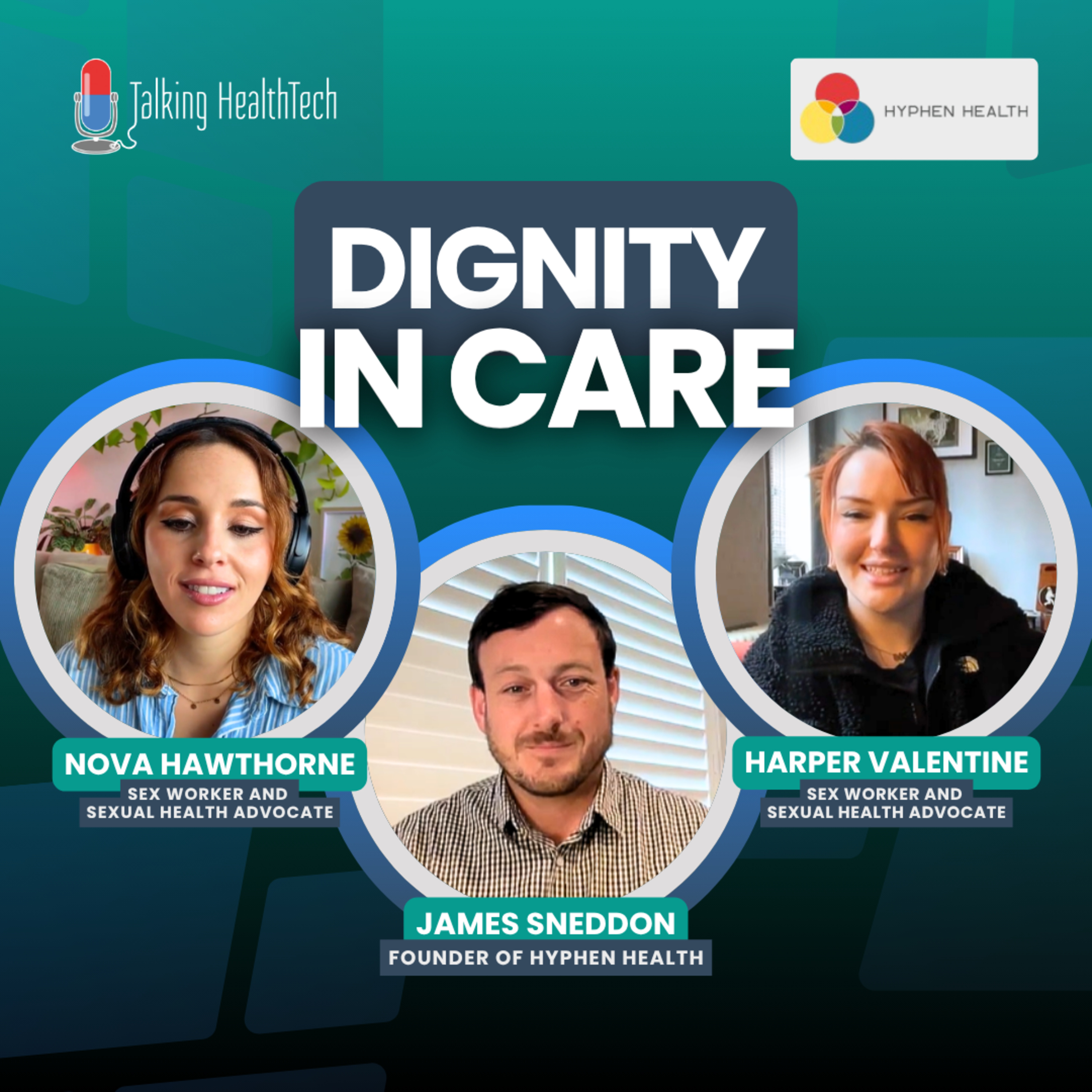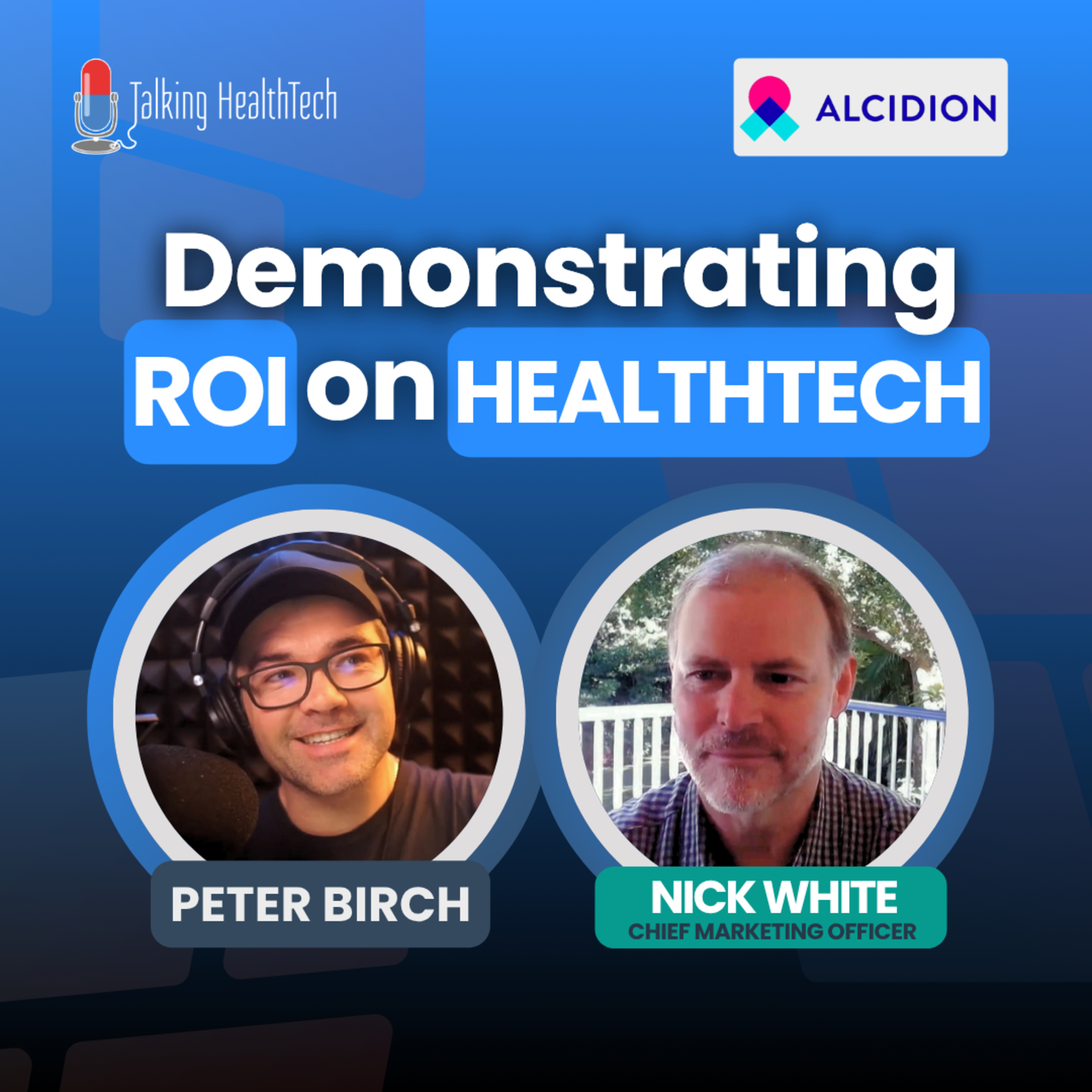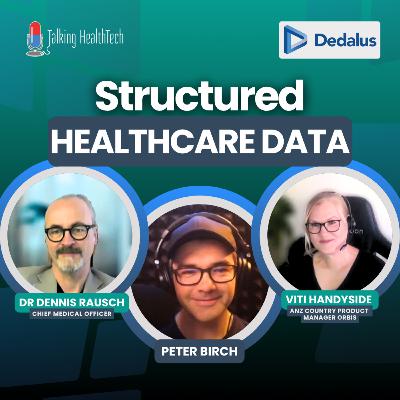Discover Talking HealthTech
Talking HealthTech

Talking HealthTech
Author: Talking HealthTech
Subscribed: 135Played: 5,950Subscribe
Share
© Talking HealthTech
Description
Conversations with clinicians, vendors, policy makers and decision makers to promote innovation and collaboration for better healthcare enabled by technology.
Learn about digital health, medical devices, medtech, biotech, health informatics, life sciences, aged care, disability, commercialisation, startups and so much more.
Learn about digital health, medical devices, medtech, biotech, health informatics, life sciences, aged care, disability, commercialisation, startups and so much more.
580 Episodes
Reverse
In this episode of Talking HealthTech, Peter Birch speaks with Declan Kelly, CEO and co-founder of Eolas Medical, about the challenges and opportunities in healthcare knowledge management. They explore how clinicians can better access both external medical evidence and context-specific internal knowledge, the importance of technology in surfacing reliable information at the point of care, and the emerging role of artificial intelligence in supporting decision making in healthcare environments.Key Takeaways:📚 Knowledge Management in Healthcare: Declan explains that clinicians need access to both external, evidence-based guidelines and internal, site-specific procedures to make informed decisions. Both are often difficult to surface when needed, leading to inefficiency and frustration.💡 Origin of Eolas Medical: The platform was created out of a real need identified within hospitals—difficulty in finding practical information quickly, particularly context-specific pathways and contacts. "Eolas" is derived from the Irish word for knowledge.🤖 Technology and Extraction: Eolas uses computer vision and artificial intelligence to extract and visually ground information from both internal documents (like policies and flowcharts buried on intranets) and external sources, ensuring that clinicians can trace answers to their original sources.🔒 AI's Role and Safety Considerations: Artificial intelligence, especially large language models, can support information retrieval but must be carefully governed, regulated, and validated for safety and trust. The adoption of such solutions varies globally due to differing regulatory environments.⚖️ Balancing Usability and Governance: Declan shares the tension between making technology user-friendly for clinicians and maintaining rigorous governance, security, and privacy—finding the right balance is ongoing and vital for uptake.📈 Adoption and Impact: Eolas has seen significant uptake among clinicians by addressing their need for immediate, trustworthy, actionable information at the point of care. The company emphasises a careful, department-by-department rollout in healthcare organisations to build evidence and trust.🚀 Future Directions: The conversation touches on the broad future of healthcare technology, speculating about the combined power of AI, knowledge management, and system interoperability over the next decades.Check out the episode and full show notes on the Talking HealthTech website.Loving the show? Leave us a review, and share it with someone who might get some value from it. Keen to take your healthtech to the next level?Become a THT+ Member for access to our online community forum, meet ups, special offers and more exclusive content. For more information visit talkinghealthtech.com/thtplus
In this episode of Talking HealthTech, host Peter Birch speaks with Claire Holt, Technical Health Information Manager at Austin Health, about the role of data management and digital health transformation in tertiary hospitals. The discussion focuses on the integration of new data capture solutions within Austin Health, with a special emphasis on the challenges and opportunities surrounding legacy systems, workflow transformation, stakeholder engagement, and mandatory reporting.This episode was recorded live at HIC 2025 in Melbourne, Australia, at the Data Capture Experts booth on the expo floor.Key Takeaways:🏥 Austin Health's Digital Landscape: With over 200 clinical systems, Austin Health's approach to technology must consider integration, interoperability, and minimising workflow disruption for clinicians.🔗 The Role of Health Information Managers: Health information managers bridge the gap between IT, clinical operations, and data reporting, ensuring legislative compliance and meaningful use of collected data.⚙️ Addressing Legacy System Challenges: Facing an end-of-life legacy software system that processed over 120,000 annual client contacts, Austin Health identified the need for a modern solution that could expand functionality and support broader use cases.🚀 Implementation and Change Management: Accelerated timelines and the addition of new modules – such as community mental health – required robust collaboration, business process engagement, and agile change management strategies.💻 Data Capture Experts Solution: Streamlined administrative functions allowed for improved referral, appointment booking, care management, and reporting – moving away from siloed spreadsheets towards integrated workflows.📊 Workflow Evolution: The new system enabled better visibility across teams, accurate activity reporting, and improved patient care continuity, especially for patients accessing multiple services.🤝 Advice for Vendors: Collaborative approaches with health information managers and strong technical-business translation are essential when building and implementing solutions in health settings.Check out the episode and full show notes on the Talking HealthTech website.Loving the show? Leave us a review, and share it with someone who might get some value from it. Keen to take your healthtech to the next level? Become a THT+ Member for access to our online community forum, meet ups, special offers and more exclusive content. For more information visit talkinghealthtech.com/thtplus
A referral should be the start of a patient’s care journey, not a roadblock. Yet too often, paper forms, phone tag and admin delays get in the way.In this episode of Talking HealthTech, Peter Birch speaks with Emily Manning, Sales Manager at Global Health, about how smarter referral management is reshaping Australian healthcare. Emily explains how MasterCare+ streamlines workflows for clinics, hospitals and community providers – reducing risk, freeing up staff time and improving the patient experience.Key Takeaways:🔄 Referral management is a critical but often overlooked part of healthcare workflows – getting it right improves both admin efficiency and patient care.🧩 MasterCare+ is a modular SaaS platform that can run standalone or integrate with existing systems, making adoption easier.🏥 The platform was co-designed with Peninsula Health in Victoria to ensure it fits local workflows, with secure messaging, triage tools and automated intake.📊 Moving away from paper reduces errors, increases visibility via dashboards and KPIs, and frees staff for higher-value work.⚠️ The risks of sticking with paper include lost referrals, heavier admin loads, compliance issues and slower patient journeys.📈 Incremental adoption helps organisations modernise without full-scale system overhauls.🤖 Future directions include AI-powered triage, risk stratification and ongoing development guided by user feedback.Check out the episode and full show notes at Talking HealthTech.If you’re enjoying the podcast, leave us a review and share it with someone who’ll find it useful.Want to connect with other digital health leaders? Join THT+ for access to our online community, meetups, exclusive content and more: talkinghealthtech.com/thtplus.
In this episode of Talking HealthTech, Peter Birch speaks with Ricardo Herreros-Symons, Chief Strategy Officer at Speechmatics, about the evolving role of speech-to-text technologies and AI-driven ambient scribing in the healthcare sector. Ricardo shares insights from his 11 years at Speechmatics, discussing the challenges and opportunities of adapting speech recognition for medical applications, the move toward innovative AI solutions, and the importance of accuracy, privacy, and regulatory compliance in handling sensitive healthcare data.Key Takeaways:🎤 Speech-to-Text in Healthcare: Speechmatics, while established in media, live captioning, and government, has recently seen growing demand in healthcare, driven by clinicians' needs rather than top-down mandates.🩺 Ambient Scribing and Clinician Workflow: There is a shift from manual transcription—where secretaries or clinicians would type up notes—to AI-powered tools that can automatically transcribe and structure patient conversations, improving efficiency and reducing clinician cognitive load.🎯 Accuracy and Context: In healthcare, accuracy is critical due to the potential for life-or-death consequences. Effective speech recognition requires comprehensive vocabularies, the ability to handle diverse accents, and context awareness to distinguish medical terminology.🤝 Collaborative Role in Solution Delivery: Speechmatics provides foundational transcription technology behind the scenes, enabling ambient scribing platforms and EMR providers to build workflow solutions tailored for their users.🌍 Language and Localisation: Healthcare consultations occur in many languages, requiring multilingual speech recognition models. Ricardo discusses how existing language models often excel in English but may need translation pipelines and continued development for long-tail languages.🔒 Privacy and Regulation: Sensitive healthcare data requires robust privacy controls and compliance with regulations like ISO 27001 and HIPAA. Deployment options include on-premise and on-device solutions to meet varying security needs.🚀 The Future of Voice AI in Healthcare: There is a growing acceptance of AI in patient interactions, particularly among younger demographics who are comfortable with bots. Voice agents and further AI integration are seen as significant opportunities for the future of healthcare technology.Check out the episode and full show notes on the Talking HealthTech website.Loving the show? Leave us a review, and share it with someone who might get some value from it. Keen to take your healthtech to the next level? Become a THT+ Member for access to our online community forum, meet ups, special offers and more exclusive content. For more information visit talkinghealthtech.com/thtplus
In this episode of Talking HealthTech, Peter Birch speaks with Phil Offer, CEO of BestMed, about the evolving landscape of medication management across aged care, primary care, and pharmacy in Australia.They discuss the challenges around syncing data between these sectors, the clinical and operational impact of medication errors, and how technology platforms like BestMed are shaping safer, more connected workflows. The episode covers the origins of BestMed, the importance of interoperability, regulatory drivers, stakeholder benefits, and the future of intelligence and AI in digital health.Key Takeaways:📊 Medication discrepancies between aged care, GPs, and pharmacies are widespread, with a University of Sydney study showing 72.6 discrepancies per 100 records—many with potential for clinical harm.💻 Digitisation and interoperability between care providers reduce manual transcription errors and potential incidents, with some facilities reporting a 63% drop in medication-related incidents.☁️ BestMed's cloud-based platform is accessed by aged care staff, pharmacists, GPs, and families, with real-time medication records for safer and more efficient management.🏛️ Regulatory standards and government support have been crucial in advancing interoperability and uptake of digital medication management in aged care.🎯 Guiding principles for product design include minimising data retranscription, integrating into user workflows, and actively seeking feedback from stakeholders.🔗 BestMed's recent integration with Best Practice Software aims to further streamline processes for GPs, minimising double-entry and enhancing workflow efficiency.💝 The emotional impact of better systems is notable—staff feel more supported, and families gain visibility, ultimately improving experience and reducing stress.🤖 Artificial intelligence is already in use for pharmacy packing checks, and future projects include AI-driven deprescribing and decision support—keeping solutions focused on practical clinical impact.Check out the episode and full show notes on the Talking HealthTech website.Loving the show? Leave us a review, and share it with someone who might get some value from it. Keen to take your healthtech to the next level? Become a THT+ Member for access to our online community forum, meet ups, special offers and more exclusive content. For more information visit talkinghealthtech.com/thtplus
In this episode of Talking HealthTech, Peter Birch speaks with Dr Jaspreet Saini (GP, practice owner and Chief Medical Officer at HotDoc), Nicole Gartrell (Programme Director of Health Connect Australia at the Australian Digital Health Agency), Craig Hodges (Group Chief Executive at Best Practice Software), Jessica White (Executive Director of Partners & Strategies at Best Practice Software), Frank Pyefinch, and Lorraine Pyefinch about innovations, challenges, and collaboration shaping the future of primary care. They discuss technology’s evolving role in general practice - from AI-powered efficiencies and foundational IT, to national health information exchange and ongoing engagement with clinicians. This episode was recorded during the Best Practice Summit 2025 in Brisbane and features a selection of conversations with GPs, practice managers, and technology leaders captured by Talking HealthTech during the event.Key Takeaways:🖨️ Foundations Before Innovation: Dr Jaspreet Saini shares the importance of ensuring basic technology—like printers and seamless workflows—works reliably before implementing more advanced tools such as AI scribes in general practice.👨⚕️ Addressing Clinician Burnout: Nearly half of GPs are experiencing burnout; technology should be implemented to reduce everyday frustrations and increase efficiencies, rather than adding complexity.🎯 Real-World Problem Solving: Understanding daily tasks and pain points from frontline staff enables meaningful tech adoption. Stakeholder consultation—listening to GPs, nurses, and practice managers—remains central.🔗 Health Information Exchange: Nicole Gartrell outlines Health Connect Australia's approach to connecting healthcare information systems nationally, focusing on enabling easy, behind-the-scenes data sharing across different clinical platforms.☁️ Practice Management Software Evolution: Craig Hodges and Jessica White discuss the direction for Best Practice, including cloud migration, interoperability, and AI, while reaffirming commitment to customer feedback and practical functionality.🤝 Industry Collaboration: Continued engagement with vendors, clinicians, government, and software partners is essential for sustainable change and responding to evolving needs in primary care.🤖 Responsible AI Adoption: AI can facilitate easier access to patient data and streamline administrative tasks, but clinician involvement is necessary to guide responsible implementation and maintain patient safety.🎓 Community and Education: Events like the Best Practice Summit foster connection, networking, and collective learning, while ongoing education around technology and new tools is pivotal for clinicians and practice staff.Check out the episode and full show notes on the Talking HealthTech website.Loving the show? Leave us a review, and share it with someone who might get some value from it. Keen to take your healthtech to the next level? Become a THT+ Member for access to our online community forum, meet ups, special offers and more exclusive content. For more information visit talkinghealthtech.com/thtplus
In this episode of Talking HealthTech, Peter Birch speaks with Dan Stinton, CEO of Healthengine, about the changing landscape of digital health platforms in Australia. They discuss Dan’s transition from digital media into the health tech sector, Healthengine’s evolution from a healthcare marketplace to a comprehensive patient engagement platform, and the introduction of new technologies like AI-powered receptionists. The conversation also covers trends in patient engagement, the impact of cost-of-living pressures on healthcare access, and the future of technology-driven healthcare delivery. Key Takeaways🔄 Over the years, Healthengine has shifted from being purely a healthcare marketplace to emphasising patient engagement tools and SaaS products, such as online bookings, recalls, reminders, and custom forms.🌐 The platform is expanding beyond GPs to include dental, allied health, specialists, and pharmacy - aiming to enable patients to manage their entire care team from one place.🤖 Healthengine has launched "Helen," an AI receptionist designed to handle administrative phone calls for GP clinics, allowing reception staff to focus on more complex tasks. Helen is already being piloted and operates strictly on non-clinical tasks for privacy and accuracy.📊 Research by Healthengine indicates around 80% of people are comfortable interacting with bots for administrative healthcare tasks, especially given the benefit of never waiting on hold.💰 Cost-of-living pressures are causing more Australians to delay essential medical care, as reflected in the upcoming Australian Healthcare Index—a survey run in partnership with Patients Australia.💻 Virtual care is on the rise, but still makes up a small proportion of Healthengine's bookings, with most telehealth appointments occurring outside regular business hours for transactional needs like repeat prescriptions.🎯 Healthengine's current strategy is to continue investment in patient engagement technology, leveraging AI for administrative efficiency without entering the space of clinical care itself.Check out the episode and full show notes on the Talking HealthTech website.Loving the show? Leave us a review, and share it with someone who might get some value from it. Keen to take your healthtech to the next level? Become a THT+ Member for access to our online community forum, meet ups, special offers and more exclusive content. For more information visit talkinghealthtech.com/thtplus
In this episode of Talking HealthTech, Peter Birch speaks with Rob Milsom from NZTE, along with Matt Russell and Matt Boyles from Aranz Medical, Will Hewitt from HeartLab, Greg O’Grady from Alimetry, and Abby Moore from Chiptech.Together, they explore the latest developments in New Zealand’s healthtech ecosystem, focusing on the future of medical technology and diagnostics, specifically AI, wearable diagnostics, medtech, and the need to keep patients, clinicians, and the wider system at the centre of innovation. The episode showcases how Kiwi companies are driving global impact in wound care, cardiac diagnostics, gut health, and personal emergency response systems.This episode is part 3 of a 3-part series created by Talking HealthTech in partnership with New Zealand Trade & Enterprise (NZTE), exploring how New Zealand’s healthtech innovators are taking their ideas from home to the world. Key Takeaways⚙️ Silhouette, developed by Aranz Medical, is transforming wound care through 3D imaging and data-driven insights, making wound management more efficient and scalable in both hospital and community settings.🤖 HeartLab is advancing cardiac diagnostics using AI, with a focus on enabling clinicians to easily and quickly access and interpret cardiac scans remotely, emphasising speed, workflow, and responsiveness across global markets.📏 Alimetry provides a wearable diagnostic solution for gut disorders, allowing for non-invasive measurement and better clinical insight into gastrointestinal symptoms, while also showcasing the process of commercialising research-driven technology in global health markets.👵 Chiptech is delivering technology-enabled care systems for ageing populations, offering scalable and adaptable personal emergency response solutions that support independence at home and address broader sector challenges.🔬 The export journeys of these companies highlight the value of deep research, user insight, collaboration, and tailored solutions in creating medtech products that resonate globally while addressing local needs.Check out the episode and full show notes on the Talking HealthTech website.Loving the show? Leave us a review, and share it with someone who might get some value from it.Keen to take your healthtech to the next level? Become a THT+ Member for access to our online community forum, meet ups, special offers and more exclusive content. For more information visit talkinghealthtech.com/thtplus
In this episode of Talking HealthTech, Peter Birch speaks with Rafic Habib, Managing Director for APAC and the Middle East at Clinovera, the healthcare division of First Line Software. The conversation explores Rafic's extensive healthcare IT experience and delves into how Clinovera and First Line Software work with organisations ranging from start-ups to government bodies to address the challenges of healthcare data management. The discussion covers the rise of generative AI and its applications, how to harness unstructured health data, the ongoing impact of interoperability standards like HL7 and FHIR, and the practical considerations for implementing new health IT tools within complex healthcare systems.Key Takeaways:🤖 Generative AI (Gen AI) is increasingly sought after by healthcare organisations. While the technology presents new opportunities, there is industry-wide uncertainty about potential applications and best practices, especially with sensitive health data.👨💻 Clinovera provides a wide range of services, including Gen AI consulting, software engineering, interoperability support (with a deep focus on HL7 and FHIR), application architecture, and cloud integration across Microsoft Azure, AWS, and Google Cloud.📄 Unstructured data, such as handwritten notes, scanned records, faxes, and PDFs, continues to be a barrier for efficient healthcare delivery. This type of data is pervasive in everyday practice and remains difficult to extract and integrate into electronic health records (EHRs) and health information systems.⚙️ The team at Clinovera has developed AI-driven tools that can ingest, analyse, and structure unstructured data from multiple sources (including different languages and poor handwriting), turning it into interoperable formats like FHIR. These capabilities allow clinicians and healthcare administrators to more easily find, analyse, and leverage crucial patient data that would otherwise remain buried.🔬 As organisations look to better integrate AI and automation, considerations like compliance, security, information governance, and the ability to deploy solutions on-site or in the cloud come to the fore. Customisation is key to meeting diverse and region-specific data requirements and regulatory standards.⏳ The best time to engage engineering support and consulting, according to Rafic, is as early as possible — whether organisations are just shaping their digital health strategy or already knee-deep in a digital transformation project. Early, collaborative engagement with engineering partners ensures that real-world problems are addressed, and organisations benefit from broader expertise during planning, pilots, and scale-up.Check out the episode and full show notes on the Talking HealthTech website.Loving the show? Leave us a review, and share it with someone who might get some value from it. Keen to take your healthtech to the next level? Become a THT+ Member for access to our online community forum, meet ups, special offers and more exclusive content. For more information visit talkinghealthtech.com/thtplus
In this episode of Talking HealthTech, Peter Birch speaks with Dr Kieran Holland from Streamliners, Ron Tenenbaum from The Clinician, Dr Stephen Pool from Core Schedule, and Niru Rajakumar from McCrae Tech about the role of people-centred innovation in healthcare.The discussion explores how New Zealand companies are redesigning clinical workflows, supporting patient engagement, and implementing technology solutions that bridge policy and practice, empower both clinicians and patients, and support sustainable system transformation.This episode is part 2 of a miniseries produced in collaboration with New Zealand Trade & Enterprise (NZTE), focusing on exporting New Zealand’s health technology to global markets.Key Takeaways🧑🤝👩 People are Central to Health Innovation: Across each conversation, a core theme is putting people—clinicians, patients, and users—at the centre of digital health solutions. Listening to real-world needs and collaborating with frontline staff is critical to building trust in new technologies.🔬 HealthPathways Bridges Policy and Practice: HealthPathways, supported by Streamliners, offers evidence-based clinical guidance blended with local system navigation, reducing variation in care and enhancing collaboration. Its model showcases the benefits of cross-jurisdictional learning and the opportunities for more national collaboration, including in places like Australia.🩺 PROMs and PREMs Shape Value-Based Care: Ron Tenenbaum explains how Patient Reported Outcome Measures (PROMs) and Patient Reported Experience Measures (PREMs) are increasingly fundamental in value-based healthcare. The challenge is not only technological, but also cultural—integrating the patient voice requires clinician buy-in and workflow adaptation.💼 Workforce Management and Fatigue Risk: Dr Stephen Pool outlines the real-world consequences of manual, disconnected rostering—such as clinician fatigue and increased risk to patient safety. Core Schedule demonstrates how digitised, clinician-driven rostering can reduce administrative burden and improve wellbeing and compliance.🏥 Hospital Modernisation Relies on Flexible, Modular Tech: Niru Rajakumar highlights the growing complexity and workforce shortages in hospitals, pointing to the need for modular, flexible hospital information systems. Starting with small changes and scaling smartly, rather than implementing one-size-fits-all solutions, can deliver value efficiently.🤖 AI’s Role is Foundational, Not a Quick Fix: Each guest emphasises that emerging tools like AI should be built on solid foundations of system integration and must address frontline realities, rather than being seen as a “silver bullet.”Check out the episode and full show notes on the Talking HealthTech website.Loving the show? Leave us a review, and share it with someone who might get some value from it.Keen to take your healthtech to the next level? Become a THT+ Member for access to our online community forum, meet ups, special offers and more exclusive content. For more information visit talkinghealthtech.com/thtplus
In this episode of Talking HealthTech, Peter Birch speaks with Mark Nevin, an executive leader and policy strategist in healthcare, and Dr. Sandra LJ Johnson, a paediatrician and expert in medical law, about the duties and responsibilities of the medical workforce in overseeing artificial intelligence (AI) in health services. The discussion explores the evolving regulatory landscape, medical duty of care, risk management, and the need for collaboration between clinicians, technologists, and regulators as AI becomes increasingly integrated into healthcare delivery.Key Takeaways🤖 Regulation of AI in healthcare should be risk-based, leveraging existing frameworks while addressing the unique challenges posed by dynamic and learning systems.⚙️ The duty of care for clinicians extends to understanding the tools and technologies they use, including the basics of how AI systems are trained and their limitations.🏥 Adoption of AI in clinical settings requires a holistic approach with multiple levels of guardrails—regulatory, specialist, clinician-patient, and consumer feedback—to ensure safety and accountability.👩🏫 Ongoing education and competency development are essential for clinicians, as medical colleges and educational bodies are now incorporating AI and digital health into their curricula.🤝 Collaboration across disciplines—between clinicians, engineers, software developers, regulators, and consumers—is key to safe and effective AI adoption in healthcare.✒️ The complexity of liability in AI-driven care highlights the importance of clear governance and delineation of responsibilities among stakeholders before issues arise.🌏 Australia is keeping pace with global advancements in AI regulation and implementation, drawing on strong collaboration between its scientific, medical, and regulatory communities.Check out the episode and full show notes on the Talking HealthTech website.Loving the show? Leave us a review, and share it with someone who might get some value from it. Keen to take your healthtech to the next level? Become a THT+ Member for access to our online community forum, meet ups, special offers and more exclusive content. For more information visit talkinghealthtech.com/thtplus
We’re excited to collaborate with New Zealand Trade & Enterprise (NZTE) to bring you a mini-series of episodes titled: “Exporting Innovation: NZ HealthTech”, exploring how New Zealand’s healthtech innovators are taking their ideas from home to the world. This episode is part 1 of 3, so stay tuned for more episodes in the series coming soon!In this episode of Talking HealthTech, Peter Birch and Rob Milsom from New Zealand Trade & Enterprise (NZTE) introduce Rei Ishikawa (Karo Data Management), Paris Majot (Orion Health), Phil Xue (Odin Health), and Nick Burns (2iQ Health). The episode focuses on how New Zealand healthtech companies are powering smart healthcare through digital infrastructure, interoperability, and data-driven solutions, both at home and globally. They cover themes like hospital capacity management, primary/community care innovation, digital integration at massive scale, and the role of credible AI in healthcare transformation.Key Takeaways👨💻 NZTE highlights New Zealand’s approach to healthtech: innovative, necessity-driven, and values-led, with global ambition to solve hard problems in healthcare delivery.🏢 Odin Health’s journey from a small NZ operation to supporting over 450 million outpatient visits globally is driven by addressing real pain points in system integration, stability, and scalability.🌍 Real-world examples show how Norwegian digital infrastructure has been deployed not just in NZ but also at scale in large Chinese hospital settings, demonstrating the power and flexibility of Kiwi technology.🤝 Karo Data Management’s work underscores the importance of trust, indigenous values, and capturing holistic wellbeing data in primary and community care, making outcomes more relevant and reporting more meaningful.📶 Orion Health’s focus is on seamless data connectivity, patient engagement, and operational analytics, supporting clinicians with unified clinical records and enabling large-scale AI-driven workflows for preventative care.🏥 2iQ Health explores proactive public hospital capacity management, making hospital operations more efficient by anticipating demand patterns, maximising limited resources, and streamlining planning for leaders and clinicians.🔗 Across all companies, the importance of interoperability, real-time data access, cloud infrastructure, and patient-centred design is emphasised as vital for improving both patient outcomes and cost efficiency in healthcare systems.🤖 AI’s role is becoming increasingly important, but its effectiveness relies on access to quality, well-structured clinical data and meaningful integration into existing workflows.💡 A global healthtech export mindset, rooted in strong local values, positions New Zealand companies to partner with Australian organisations and those beyond for scalable healthcare innovation.Check out the episode and full show notes on the Talking HealthTech website.Loving the show? Leave us a review, and share it with someone who might get some value from it. Keen to take your healthtech to the next level? Become a THT+ Member for access to our online community forum, meet ups, special offers and more exclusive content. For more information visit talkinghealthtech.com/thtplus
In this episode of Talking HealthTech, Peter Birch speaks with Patrick Hart, a medical doctor and product lead at Concentric Health, about the vital topic of consent in healthcare. The discussion explores digital consent solutions, the current challenges with paper-based consent processes, how shared decision making can be improved, and what modernising the consent process means for patient experience and clinical outcomes. Patrick shares insights from Concentric's experience in the UK and their upcoming expansion into the Australian and New Zealand healthcare systems.Key Takeaways✅ Consent in healthcare is often treated as a tick-box paper exercise, conducted at the last minute with minimal patient engagement.🗨️ Shared decision making involves clinicians and patients collaborating, leading to better treatment choices and improved patient outcomes.🖥️ Concentric Health provides a digital, template-based consent platform that standardises information while allowing personalisation for each patient.📈 Standardised digital consent can increase shared-decision making from 28% (with paper) to 72%, significantly improving patient involvement.📊 Digitising consent reduces administrative burden, decreases on-the-day treatment delays and cancellations, and minimises errors and medico-legal risks.🌍 In the UK, Concentric is used in over 30 NHS organisations and across private health groups, entirely replacing paper consent in many settings.👩💻 The current Australian consent process mirrors where the UK was several years ago; there is opportunity for improvement through digital adoption.⚙️ Digital consent tools enhance efficiency, reduce environmental impact, and improve patient and clinician satisfaction.🔍 Concentric is seeking pilot partners in Australia and New Zealand to adapt and deploy their digital consent system.Check out the episode and full show notes on the Talking HealthTech website.Loving the show? Leave us a review, and share it with someone who might get some value from it. Keen to take your healthtech to the next level? Become a THT+ Member for access to our online community forum, meet ups, special offers and more exclusive content. For more information visit talkinghealthtech.com/thtplus
In this episode of Talking HealthTech, Peter Birch speaks with Leon Young, Founder of Cogniss, Dr Sarah Hanieh, paediatrician and public health researcher, Professor Caroline Donovan, clinical psychologist at Griffith University, and Adjunct Professor Annette Schmiede. The episode covers the 2025 Priority Digital Health Challenge, delivered by Cogniss AWS and the Validatron, supported by the AIDH, the Digital Health CRC, NextGen, and Talking HealthTech. You’ll hear from members of the expert judging panel and the two winners from the challenge.We explore how digital health solutions are being co-designed and developed for underserved, priority populations, with a focus on bridging the gap between research, evidence-based innovation, and real-world impact. Key Takeaways🏢 The Priority Digital Health Challenge supports the creation of digital health solutions for underserved and priority populations, focusing on real-world needs that often do not fit traditional commercial models.🤝 Initiatives like the Challenge help surface solutions arising from lived experience and subject matter expertise, particularly for communities and conditions often overlooked by mainstream systems.👩⚕️ A strong emphasis is placed on making the process less daunting for health professionals and researchers, who may not be traditional entrepreneurs, by avoiding typical startup competition formats.⚙️ Winning projects included Project Shine, a culturally tailored nutrition literacy tool for refugee and migrant communities, and Lights Out, an evidence-based child sleep intervention programme being transformed into an app.💰 There is a significant challenge in translating research-led solutions into accessible, procured offerings within health systems due to limitations in procurement pathways and funding.🗣️ Democratizing innovation opportunities and using co-design principles ensures voices from diverse communities are heard, leading to more impactful and culturally relevant solutions.🌏 Upcoming initiatives, like the Ripple programme, aim to scale the Challenge internationally, provide more sustained support to cohorts of solutions, and address systemic gaps in distribution and uptake.Check out the episode and full show notes on the Talking HealthTech website.Loving the show? Leave us a review, and share it with someone who might get some value from it. Keen to take your healthtech to the next level? Become a THT+ Member for access to our online community forum, meet ups, special offers and more exclusive content. For more information visit talkinghealthtech.com/thtplus
In this episode of Talking HealthTech, Peter Birch speaks with Bettina McMahon (CEO of HealthDirect Australia), Sanka Amadoru (Geriatrician and Founding Director of ARIA Health), and Elise Ford (Account Manager at Informedix) about the challenges and opportunities involved in building and sustaining multidisciplinary teams (MDTs) in healthcare.They explore approaches to fostering effective collaboration across hospitals, the community, and aged care settings, examining the key barriers such as siloed systems, workforce shortages, and the evolving role of technology, including AI. This episode was recorded live online as part of a special session with Talking HealthTech company partners, Infomedix. Key Takeaways🗨️ Barriers to MDT Effectiveness: The panel discusses the main obstacles to effective multidisciplinary teams, with the majority of the audience survey identifying siloed systems, data, and technology as the biggest barrier, followed by poor communication and unclear team roles.🧑🤝👩 The Consumer-Centred Approach: Future-ready teams will need to be structured around patient-centred care. Consumers are increasingly expecting to be active participants, managing their own health conditions with support from their care teams, technology, and peer communities.👨💻 Integration of Technology: Technology is seen as essential for providing visibility and coordination across MDTs. However, it's stressed that technology solutions must align with the real-world workflow of clinical teams and shouldn’t add unnecessary administrative burden.🤖 Role of AI in Healthcare Teams: There is optimism about the potential for AI to augment MDTs, from triaging patients to supporting decision-making. However, adoption must be pragmatic, with safety, trust, and workforce adaptation in focus.🔍 Evolving Models of Care: The panel highlights real-world MDT case studies in settings like ‘Better at Home’ rehabilitation, aged care, and digital health navigation, underscoring both successful integrations and ongoing gaps, especially where external providers or systems remain siloed.🩺 Pragmatism and Flexibility: The importance of practical flexibility in MDTs is emphasised, both in adapting to unique patient needs and in navigating imperfect or incomplete technology solutions.💼 Workforce Pressures and Training: The growing demands on the healthcare workforce, particularly in nursing, are creating urgency for technology to take on a greater role. The significance of digital literacy and ongoing professional development is also explored.Check out the episode and full show notes on the Talking HealthTech website.Loving the show? Leave us a review, and share it with someone who might get some value from it. Keen to take your healthtech to the next level? Become a THT+ Member for access to our online community forum, meet ups, special offers and more exclusive content. For more information visit talkinghealthtech.com/thtplus
In this episode of Talking HealthTech, Peter Birch speaks with Silvia Fazekas and Tracy Pemberton from Miller Blue Group about the critical role of change management in the successful implementation of digital health technology.Drawing on nearly two decades of practical experience in Australian healthcare and digital transformation, Sylvia and Tracy share their perspectives on the people side of tech projects, the importance of user engagement, and the need for ongoing support beyond the initial rollout. The conversation covers strategies for ensuring benefits realisation, managing stakeholders at all levels, and the concept of "enthusiasm as a service" to drive adoption of digital solutions in complex healthcare environments.Key Takeaways🤝 Change management is essential in digital health implementations because technology alone does not deliver benefits—people and processes are key.👩⚕️ Healthcare environments are complicated, and technology is often not the top priority for clinicians dealing with immediate patient care.🏥 Understanding clinical context, including terminology and frontline pressures, is crucial for effective change management.➕ Implementation support should go beyond emails and documentation, providing hands-on, in-context assistance and follow-up to ensure new systems embed successfully.🗣️ Engaging everyone, from frontline clinicians to executive leadership, is important for successful adoption. Senior leaders should understand and even use the systems being implemented.💰 Change management is often under-resourced in budgets, yet ongoing user support is necessary to realise the full benefits of digital transformation.🫂 Peer-to-peer support among users and visibility of improvements based on user feedback can significantly increase engagement and buy-in.🗨️ Users are encouraged to engage with change teams, provide feedback, and approach new systems with an open mind to maximise productivity gains and improve patient care.Check out the episode and full show notes on the Talking HealthTech website.Loving the show? Leave us a review, and share it with someone who might get some value from it. Keen to take your healthtech to the next level?Become a THT+ Member for access to our online community forum, meet ups, special offers and more exclusive content. For more information visit talkinghealthtech.com/thtplus
In this episode of Talking HealthTech, Peter Birch speaks with Greg Rosenbauer, CEO and co-founder of Your Brain Health, and Lynette Reeves, Digital Health Lead at Miroma Project Factory (MPF), about the process of building digital health solutions. The conversation explores challenges faced by founders, the importance of early-stage consultation before writing code, and the unique hurdles of commercialising research and scaling health technology products.Key Takeaways🔍 Building digital health products should not start with coding. Early focus needs to be on understanding the problem, the end users, and identifying who will actually pay for the solution.🧠 Validation through stakeholder engagement, workflow mapping, and customer experience analysis is essential before moving into technology development.✍️ Health technology projects require consideration of compliance, regulation, integration with electronic health records (EHR/EMR), and can rarely be solved in a single development cycle.📃 Many innovations stem from clinicians or researchers dealing with fragmented or inefficient processes, often starting as paper-based or spreadsheet solutions before evolving into scalable platforms.👩🏫 The commercialisation journey is especially complex for academic researchers, as there can be a significant gap between evidence generation and market readiness. Consultancy and grant support are key enablers.🏥 Accelerators, grants, and support organisations like ANDHealth and Cicada Innovations are available in Australia to help bridge the “messy middle” between research and commercialisation, but the process remains competitive and challenging.💻 Co-design with diverse clients and iterative development enable digital health solutions to remain flexible and relevant as user needs and market opportunities evolve.Check out the episode and full show notes on the Talking HealthTech website.Loving the show? Leave us a review, and share it with someone who might get some value from it. Keen to take your healthtech to the next level? Become a THT+ Member for access to our online community forum, meet ups, special offers and more exclusive content. For more information visit talkinghealthtech.com/thtplus
In this episode of Talking HealthTech, Peter Birch speaks with James Sneddon from Hyphen Health, along with advocates and creators Harper Valentine and Nova Hawthorne, about sexual health stigma and the systems that need to be fixed to make healthcare genuinely accessible for marginalised and underserved communities.Key Takeaways♀️Sexual health stigma remains a major barrier: Many individuals, particularly sex workers, avoid testing and seeking care due to experiences of judgement and misunderstanding in traditional health settings.👩💻 Online services increase accessibility and dignity: Virtual clinics and online platforms provide more tailored, empathetic, and user-friendly health services for sex workers, offering greater privacy and speed.🧑🤝🧑Importance of co-design and community feedback: Involving people with lived experience in the design and ongoing improvement of healthcare services is essential for genuine patient-centred care.👩⚕️ Advice for practitioners and the ecosystem: Treating everyone with dignity, listening to patient feedback, and maintaining a continuous inclusivity feedback loop are crucial for breaking down stigma and improving care.Check out the episode and full show notes on the Talking HealthTech website.Loving the show? Leave us a review, and share it with someone who might get some value from it. Keen to take your healthtech to the next level? Become a THT+ Member for access to our online community forum, meet ups, special offers and more exclusive content. For more information visit talkinghealthtech.com/thtplus
In this episode of Talking HealthTech, host Peter Birch speaks with Nick White from Alcidion about the challenges, strategies, and frameworks involved in developing business cases for digital technology initiatives in healthcare, with a particular focus on patient flow.Nick shares his experience on aligning technology adoption with organisational priorities, the complexity of healthcare funding and stakeholders, and ways to evaluate and communicate the impact of digital solutions, including real-time data platforms and AI capabilities.Key Takeaways:💼 Business cases in healthcare are complex due to the critical nature of outcomes, the many stakeholder groups, and unique funding models.🗣️ The aim is to explain, not justify, the rationale for adopting digital health solutions, ensuring alignment with strategic priorities rather than merely convincing stakeholders.😷 Patient flow is a national priority in Australia, presenting challenges such as ageing populations, staff shortages, and resource constraints that require better decision-making tools and operational workflows.👩⚕️Unlike other sectors, healthcare business cases must balance quantifiable financial benefits with intangible benefits like patient experience, staff wellbeing, and clinician workflows.🏛️ Frameworks like the quadruple aim (patient experience, population health, financial impact, and clinician experience) help structure business cases to reflect the multi-faceted value of technology.🔍 Using independent impact studies and evidence-based research is key to substantiating expected benefits and outcomes in business cases.♒ Ripple effects, such as reductions in length of stay or administrative burden, can free up resources elsewhere in the system, but translating these benefits into financial figures can be nuanced.💡Strategic alignment with existing technical architecture and organisational direction is essential to avoid unnecessary complexity and to maximise the impact of digital investments.🩺 Clinician engagement and change management are crucial, with a focus on making improvements that support, rather than disrupt, patient care.🤖 The future of patient flow technology involves greater AI integration, advanced mobile capabilities, and real-time information delivery at the point of care.Check out the episode and full show notes on the Talking HealthTech website.Loving the show? Leave us a review, and share it with someone who might get some value from it. Keen to take your healthtech to the next level? Become a THT+ Member for access to our online community forum, meet ups, special offers and more exclusive content. For more information visit talkinghealthtech.com/thtplus
In this episode of Talking HealthTech, Peter Birch speaks with Dr Dennis Rausch, Chief Medical Officer at Dedalus, and Viti Handyside, ANZ Country Product Manager for ORBIS at Dedalus, about the importance and benefits of structured data in Health IT. The episode explores the challenges and opportunities associated with embedding structured data in electronic medical records (EMRs), the impact on clinicians’ daily workflows, and the broader implications for patient outcomes, operational efficiency, and health system innovation. They cover both local and global perspectives, examining how structured data enables better care, supports research, and sets the foundation for advances such as artificial intelligence in healthcare.Key Takeaways:🏥 Structured data in healthcare is critical for accurate data analytics, decision support, interoperability, and operational efficiency.📝 Free-text notes, while common in clinical workflows, can create ambiguity, increase cognitive load, and make it difficult for machines to interpret and leverage health data.🔗 Embedding structured data entry into clinicians’ natural workflows is key to adoption, reducing manual data entry burden, and improving data quality.🤖 New technologies, including ambient AI, natural language processing, and smart EMR interfaces, are enabling more seamless capture and utilisation of both structured and unstructured clinical information.🔍 Structured data enhances research capabilities, supports the development of digital twins, reduces errors, facilitates compliance, and helps avoid costly duplicate testing and administrative inefficiencies.🌍 There is still a journey required for widespread adoption in regions like Australia, but growing interest and investment in digital health is driving progress.💊 Future healthcare ecosystems will rely even more on structured data to power clinical decision support, population health analytics, and personalised medicine.Check out the episode and full show notes on the Talking HealthTech website.Loving the show? Leave us a review, and share it with someone who might get some value from it. Keen to take your healthtech to the next level? Become a THT+ Member for access to our online community forum, meet ups, special offers and more exclusive content. For more information visit talkinghealthtech.com/thtplus




